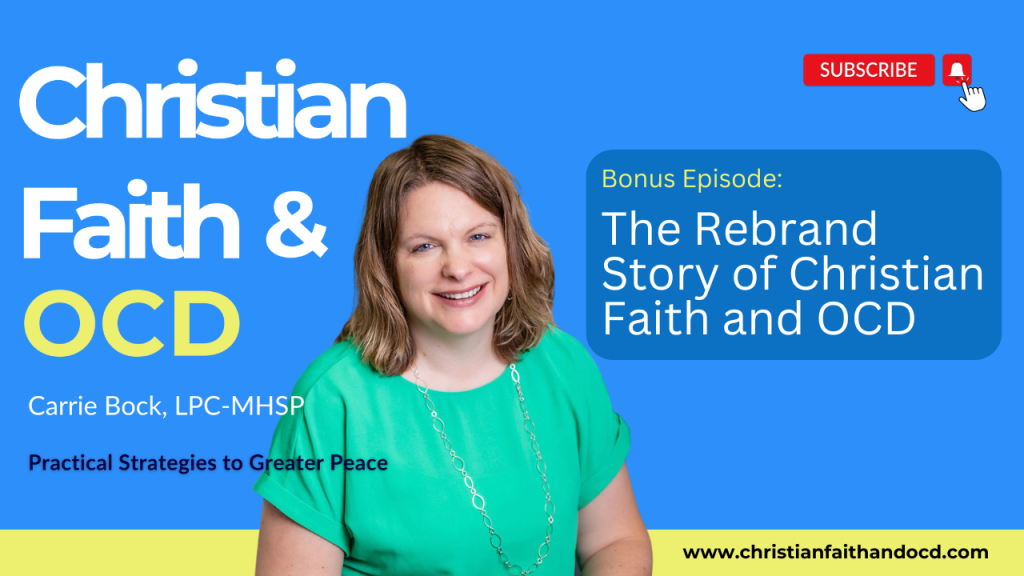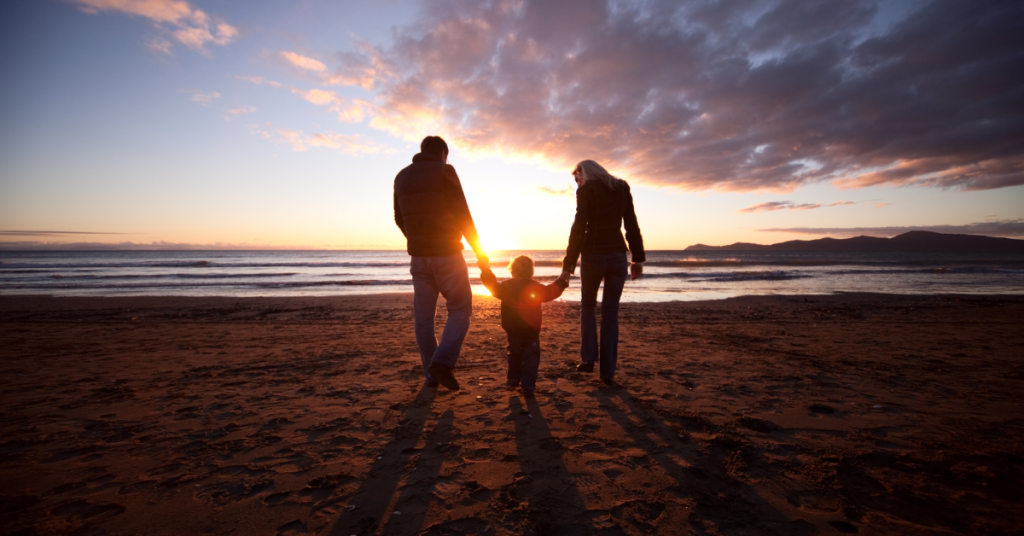133. Looking for an Alternative to ERP? Find out if ICBT is Right for You
Carrie discusses Inference-Based Cognitive Behavioral Therapy (ICBT) as a helpful option, explaining how it differs from ERP in addressing OCD symptoms and integrating faith perspectives.
Join her as she explores ways to find peace and faith while managing OCD through these therapeutic approaches.
Episode Highlights:
- The principles of ICBT and its approach to mental compulsions.
- The importance of respecting someone’s faith in OCD treatment.
- Common misconceptions about OCD treatment options and their effectiveness.
- Practical tips for considering ICBT over traditional ERP methods.
Episode Summary:
In this episode of Christian Faith and OCD, I discuss an alternative to Exposure and Response Prevention (ERP) called Inference-based Cognitive Behavioral Therapy (ICBT). While ERP is the gold standard for treating OCD, it’s not always the right fit for everyone. Some find ERP too overwhelming or not trauma-informed, especially those dealing with co-occurring conditions like PTSD. ICBT offers a different approach, focusing on challenging the obsessional doubt at its core rather than just managing the anxiety it produces.
ICBT helps you recognize that OCD weaves facts with imagination, creating a story that feels all too real. By identifying the crossover point where you shift from the present moment into this imagined scenario, you can begin to break free from the cycle of obsessions and compulsions. What I love most about ICBT is its focus on the “feared self” versus the “real self.” The feared self is who OCD tries to convince you that you are or will become, but it’s a false identity. ICBT helps you reconnect with who God says you are—loved, valued, and free.
If you’re wondering which therapy is right for you, it’s essential to choose the path that aligns with your needs and challenges. Both ERP and ICBT require dedication and hard work, but the reward is a life of greater freedom and peace. Remember, you are stronger than you know, and you can overcome the struggles of OCD with the right support.
Thank you for joining me today. If you found this episode helpful, I’d appreciate it if you could leave a review on iTunes or Apple Podcasts. Your feedback helps others find our show and begin their healing journey. Until next time, may you be comforted by God’s great love for you.
Explore related episodes:
Transcript
Hello and welcome to Christian Faith and OCD with Carrie Bock. I’m a Christ follower, wife and mother licensed professional counselor who helps Christians struggling with OCD get to a deeper level of healing. When I couldn’t find resources for my clients with OCD, God called me to bring this podcast to you. With practical tools for developing greater peace. We’re here to bust through the shame and stigma surrounding struggling with OCD as a Christian, sharing hopeful stories of healing and helping you replace uncertainty with faith. I’m here to help you let go of the past and future to walk in the present abundant life God has for you.
Let’s dive right into today’s episode. If you haven’t heard, we are running a freedom from mental compulsions challenge on August the 5th at noon central time. You can sign up at www.hopeforanxietyandocd. com/challenge and we’re going to be giving away some cool stuff like free coaching with Keri, and maybe some coffee gift cards thrown in there.
You’re not going to want to miss it, so I will see you there. Welcome to episode 133. Have you been looking for an alternative to exposure and response prevention, ERP? I know that this is an important thing that many individuals with OCD are looking for. Maybe you’ve had a bad experience with ERP. Maybe it just feels too big or too overwhelming or too scary to do.
Maybe you’ve heard stories from other people and don’t feel as comfortable with the therapy. Well, today we’re going to talk a little bit about exposure and response prevention and then talk about ICBT as a potential alternative. I don’t want you to get stuck on black-or-white thinking, like one of these therapies is right, one is wrong, one is better, one is not better. Both of these therapies have been researched and are evidence-based treatments for obsessive-compulsive disorder. Both therapies have helped people heal, so we’re not in the interest of putting one above the other. We’re just letting you know that there are options out there that some people in the OCD community don’t know about.
What is exposure response prevention? This is a behaviorally based therapy. that focuses on developing a treatment hierarchy, things that you are avoiding due to OCD, things that you fear engaging with, and then you develop exposures, gradually exposing yourself to the things that are scaring you in order to overall reduce the anxiety, decrease the compulsions because you’re engaging in the activity.
You’re feeling the anxiety and you’re not engaging in the compulsion. It’s a way to retrain your brain so that when you encounter those things in the future, the triggers, you know, okay, this is OCD. I’m fully aware of what it is. It’s very uncomfortable, but I can sit with this and not engage in the compulsive activity.
Exposure and response prevention is referred to by the International OCD Foundation, among others, as the gold standard for OCD treatment. We’ve talked more in depth about ERP on the show. You can go back and listen to episode number 74. with Stacey Quick and episode 111 with Judy Lair, who both talk more in depth about what exposure and response prevention is and how it can be helpful for OCD. Both of these individuals work for NoCD, which is a online therapy group, and NoCD specifically hires therapists and focuses on using strict ERP as their main focus of treatment. Like any large online therapy practice, it really depends on the therapist that you get connected with and whether or not you have a good connection or relationship as far as what your success may or may not be.
If you’re going to be doing hard things, obviously feeling comfortable with the person you are doing those hard things with is really important. This is true for any type of therapy, not just ERP. I have a much older episode about ERP not being the only treatment for OCD where I talk about utilizing EMDR to really get down to the core fear and the inadequacies that people feel about themselves to create a sense of healing and that as we treat the trauma and those core fears that a lot of times the OCD symptoms would go down. I definitely need to update that episode now that I am engaged with doing more inference-based cognitive behavioral therapy, or ICBT, as we’re going to call that. This episode has been pretty popular. People have searched and found it on Google because they’re looking for alternatives to ERP. If this is the gold standard, then we have to ask ourselves, why are people looking for alternatives?
There’s several different reasons for that. ERP is effective, but it’s not perfect. I’m a therapist. I can tell you that no therapy is perfect. EMDR is not perfect. ERP is not perfect. ICBT is not perfect. This is why therapists often use multiple modalities of therapies with their clients in order to help them find the greatest level of healing. That would make you a somewhat eclectic therapist if you’re using multiple therapy modalities. When you get too stuck on one and try to pigeonhole everyone into the same type of therapy, I’ve probably done it myself, admittedly, then you run into all sorts of problems because people are complex beings and they come in with complex presentations.
One quarter of individuals who meet criteria for an OCD diagnosis also meet criteria for a PTSD diagnosis. There are times where ERP is not always trauma informed. It may exacerbate PTSD symptoms. I’ve had this happen with clients who saw a prior therapist to myself, and they were really just kind of encouraged by the ERP therapist of like, hey, well, this is a treatment for OCD.
We’ve got to keep doing this. We’ve got to keep going down this road, and unfortunately, they may have failed to look at the entire clinical presentation of that individual. Another reason people are looking for alternatives to ERP is that it’s hard. The reality of sitting with all of these uncomfortable anxieties, emotions, fear, body sensations that come up connected with that, it’s hard, and a lot of people end up dropping out of the process.
Just as ERP is at times not trauma-informed, it can be depending on the therapist. At times, it’s not religiously sensitive. I’ve also seen cases of this and that’s highly unfortunate because the International OCD Foundation has a great page on their website about religiously sensitive exposures.
They’re also very open and focused on working with clergy of a variety of different faith communities to help people who are dealing with scrupulosity or religious obsessions be able to get the best care and treatment possible. Let’s say that you’re doing ERP and maybe you cannot find a Christian therapist in your area who does that.
You may want to ask if that therapist would be willing to connect with your pastor to help you create appropriately religiously sensitive exposures so that you’re not feeling like you’re going against your faith by engaging in treatment. That is not what any ERP therapist would want you to do.
Another potential issue with ERP is that it can be harder to target mental compulsions. This is where I feel like ICBT has an edge over ERP. If you are targeting mental, like, worst-case scenarios, a lot of that’s imaginal exposure, where you’re having to write imaginal scripts and read those over and over.
A lot of times you’re writing down things that are not true about yourself, things that are not true about God. Some Christians struggle sitting with those things, to be quite honest, and I would be as well if I was the one having to engage in that type of therapy. The goal of that imaginal script is to retrain your brain to recognize that it doesn’t have to have a hold on you, and it doesn’t have to continue to create anxiety. You are sitting with the anxiety and essentially making it boring. I find that sometimes people end up playing whack-a-mole with their symptoms, doing a lot of different exposures over a variety of different themes, but they’re not really getting at the core fear. This is something that I feel ICBT does a little bit better job of.
Before I really knew about ICBT, like I said, I was using a lot of EMDR to really help people drill down what is it that you are really, really afraid of. Not just, I’m afraid of getting sick or I’m afraid of getting somebody else sick if I touch this doorknob. But. Like this deeper level of that, that deeper layer might be something like, I’m going to get so sick that I won’t be able to take care of my children and my family and other people will suffer.
At its core, exposure and response prevention is focused On feeling the anxiety, not engaging in the compulsion. So they’re focused on that piece of the equation. ICBT is different. It focuses on recognizing that the obsession is really irrelevant to the present moment right now. So if you resolve the obsessional doubt than you resolve the need to engage in the compulsion.
There are 12 modules to ICBT, so obviously it would take a long time to go through each of those modules. That’s another plug to join us in the workshop on August 5th where we’ll be able to talk about this more in depth. ICBT is based on the idea of inferential confusion. People with OCD overestimate possibility. They make irrelevant associations. They disregard sensory information, not just your five senses, but also your sense of self, who you are as a person. ICBT requires you to really slow down and focus on your thought process in a different way. It’s validating to a lot of my clients because it lets them know the obsession isn’t just coming out of nowhere.
There are reasons that you’re thinking these things that you’re thinking. It’s based on information that you know to be true that’s just a plain fact. Like germs are real. As a Christian, we have certain facts that we believe about forgiveness, repentance, salvation. Obsessional doubt may come from your own personal experience as well as hearing about the experiences of others, whether that’s people you know or whether it’s just another YouTube video you watched or something you read on Reddit.
What ICBT does is it helps you recognize that OCD is taking those facts and weaving them in with imagination to create a story. And this is not just any story, it is like a lifetime movie based on a true story that really sucks you in. and causes you to feel intense emotions, intense level of fear, even though nothing bad is happening right now.
ICBT helps you identify that when you get triggered, there is this crossover point from the present moment experience over into the imagination. And learning that crossover point helps you not to continue on with the obsessional story. But here’s my favorite part about ICBT. It causes you to look at identifying the feared self versus the real self.
The feared self is who you believe that OCD is telling you either that you are right now or that you’re going to become if you don’t engage in these compulsions. For example, someone may believe that if they don’t read their Bible enough, that means they are not a good Christian. Of course, reading your Bible enough is very relative.
I only read one chapter today, does that mean that I don’t really love God or don’t really care about Him? This belief system about self Whether it’s that I’m unworthy, not enough, that I’m going to harm other people, that somehow I have these, like, deep-seated desires to do things that are inappropriate.
That is a feared self, and it’s a false self. It’s not who you really are. Who you really are is who God says that you are. You are loved. You are valued. God wants you to have abundant life. God wants you to have joy. God wants you to have joy, even in the midst of difficult circumstances. You are a child of God. You are forgiven. You are free.
There are so many different things that I could say here about who you are in Christ. I encourage you to search the scriptures for those yourself. So let’s talk for a moment about, well, which therapy is best for me? How do I know? Here’s what I know. OCD recovery is no joke, okay? It’s hard either way. So whether you do ERP or whether you do ICBT, it’s going to be difficult. It’s going to require time. It’s going to require dedication. So choose your hard. You know what’s even harder? Living with unmanaged OCD symptoms that sucks the joy out of your life when God is calling you toward an abundant life with Him where there is joy and peace and freedom on the other side. I want you to know that whatever you choose to do to engage in, in your recovery of OCD, that you are strong. Stronger than you know. You can do hard things and I pray that you find the help that you need and the support that you need to be able to walk through these challenging times as you’re struggling as you know,
We’re in the process of of rebranding a bit and getting our website fixed. So until then, we are still at hopeforanxietyandocd.com or you can find me at my counseling practice, bythewellcounseling.com. Thanks so much for listening. Until next time, may you be comforted by God’s great love for you.
Were you blessed by today’s episode? If so, I’d really appreciate it if you would go over to your iTunes account or Apple Podcasts app on your computer if you’re an Android person and leave us a review. This really helps other Christians who are struggling with OCD be able to find our show. Christian Faith and OCD is a production of By The Well Counseling. This podcast is for informational purposes only and should not be a substitute for seeking mental health treatment in your area.







